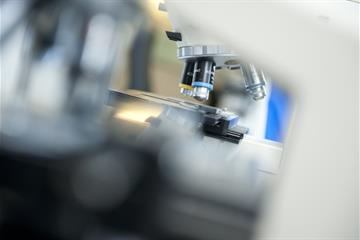Diagnostic services in haematology and hemostaseology are provided 24 hours a day. A fully automated hematologic analyzer with a fluorescence flow cytometry unit allows the rapid generation of high quality haematological profiles including differential leukocyte counts. The unit is attached to a fully automated slide maker and stainer which performs standardized smear preparation, adjusting spreader blade angle, spreader speed, and blood volume, depending on the predetermined blood parameters (HCT) for each individual pathological sample.
 Pathological blood smears are evaluated manually by specially trained laboratory technicians and physicians. After medical validation the results are directly forwarded to the wards and outpatient clinics.
Pathological blood smears are evaluated manually by specially trained laboratory technicians and physicians. After medical validation the results are directly forwarded to the wards and outpatient clinics.
Our institute offers the full range of clinically relevant standard coagulation tests as well as specific assays to evaluate plasmatic coagulation, platelet function and tests for risk assessment of thrombophilia including genetic testing.
